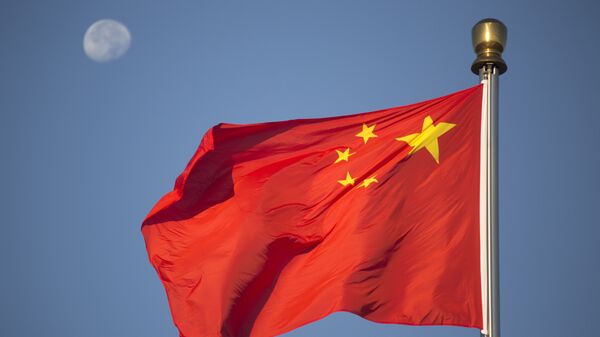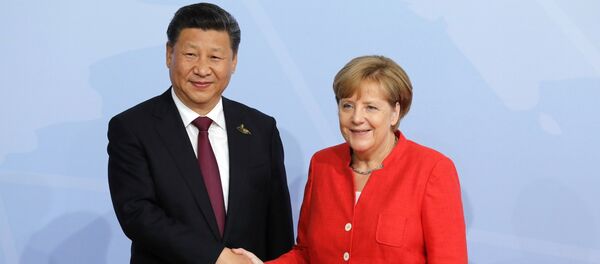Hai, CEO of the Made in Africa initiative and adviser to the governments of Ethiopia, Rwanda, and Senegal on investment promotion and industrialization, has been advancing the idea of trilateral cooperation among China, Europe and Africa since 2013.
"It is inevitable for China, Germany and Africa to finally resort to collaboration to address some of their current challenges," Hai told the Global Times.
To her, the collaboration will kill three birds with one stone — help Africa get out of poverty and achieve stability, meet the demands of economic transformation and industrial upgrade of China, and help resolve the refugee crisis in Germany.
In May, top commerce officers from the two countries inaugurated the Sino-German Center for Sustainable Development in Beijing. The center aims to promote bilateral economic cooperation in African countries, leveraging China's rich experience of infrastructure investment in Africa and German know-how in the field of vocational training, environment and energy technology.
"China and Germany are cooperating in third-country markets such as Rwanda and Angola," Merkel told reporters during the closing media briefing of the summit. "Though the cooperation is still at a nascent stage, it has great potential."
Major player
According to a recent report by McKinsey Africa, China's engagement with Africa has enjoyed an unparalleled development in the past decade, with trade growing at around 20 percent annually and 10,000 Chinese firms operating in Africa, said a Deutsche Welle report in late June.
Chinese enterprises made more than $750 million of non-financial direct investment in African countries in the first quarter of 2017, up 64 percent year-on-year, Chinese commerce ministry spokesperson Sun Jiwei said in May, according to the Xinhua News Agency.
Matthew Tsamenyi, executive director of the Africa program at the China Europe International Business School, believes that although Europe and the US have over the past decades been the most influential partners in Africa in terms of trade, investment and aid, China has established a huge presence on the scene as an equally influential player.
"Over the past two decades, China has surpassed a number of Western countries to become a major player on the continent," Tsamenyi told the Global Times.
He added that China has provided a lot of funding to infrastructure projects in Africa, which forms the foundation for the continent's industrialization and economic development.
China has been the largest investor in African infrastructure for years. According to Infrastructure Financing Trends in Africa 2015, the latest annual report released by the Infrastructure Consortium for Africa, the total funding for African infrastructure reached $83.5 billion in 2015, of which $20.9 billion came from China.
"The biggest gain for Africa in all of this is that besides the Western powers, it now has a powerful alternative market and collaborator and thus a bigger bargaining power during trade and other development negotiations," said Tsamenyi.
Powerful combination
At its Hangzhou summit in 2016, the G20 announced the Initiative on Supporting Industrialization in Africa and Least Developed Countries (LDCs), the first of its kind. As the host of the summit, China encouraged the world's biggest economies to support the industrialization of Africa, and endorse it as the solution for development challenges in the region.
The Hamburg summit continued the G20's engagement with Africa. The agenda focused on the Compact with Africa initiative, which is aimed at promoting private sector investment, supporting infrastructure development and achieving greater employment in Africa.
It is widely believed that the collaboration between China and Germany is a powerful combination that can give full play to their respective advantages — China's rich experience of investing in African infrastructure and Germany's high-level industrial technology.
"Two of the biggest requirements for successful investments in Africa are the security of law and a capable infrastructure on land and water. Hence, technology and infrastructure are the key areas for collaboration [between China and Germany in a third market]," Joachim Pfeiffer, Member of Parliament and the economic and energy policy spokesperson for Germany's ruling CDU party, wrote in an e-mail to the Global Times.
Dong Bin, chairman of committee of the Sino-European Entrepreneurs Summit, believes that Germany prefers to collaborate with China compared to other countries, because there is a strong complementarity between the two countries as they have different levels of technological and industrial development.
"When it comes to collaboration in investment and business, complementarity is a very important factor. Compared with other influential players in Africa such as European countries and the US, apparently China has a higher level of complementarity with Germany," Dong told the Global Times.
To Tsamenyi, it is important that big powers do not see themselves as competitors when it comes to dealing with developing economies like those in Africa.
"For Germany and China, such cooperation will be beneficial to both countries as they can leverage on their individual comparative advantage," he said. "Overall, developing economies [in Africa] will benefit more from such cooperation than dealing with individual countries separately."
Land of opportunity
Hai began her investment in Africa in 2011, when she opened a shoe factory in Ethiopian capital Addis Ababa. She hired thousands of local workers; and within six months, her factory's export volume to Europe and North America doubled.
Hai believes Africa has ushered in the golden period of development and will become the next manufacturing hub for the global market.
"As China gradually turns from labor-intensive to capital-intensive economy, it will create a surplus of 85 million jobs. The volume of the vacant jobs is too big to be digested by small labor markets like Southeast Asia, while Africa, with its huge working age population, is an ideal place to take over those jobs," said Hai, who established the largest shoe manufacturing plant in sub-Saharan Africa and set up a garment export factory in Rwanda in record time.
"It is also a golden opportunity for a developed country like Germany and a growing economy like China to join the trend and reshape the international industry chain," she told the Global Times.
Tsamenyi believes Germany's approach in Africa is significantly different from that of China, and Germany should adjust its African strategy, from seeing it as a continent that needs aid to a continent that needs investment to promote private sector development.
"German companies can partner with Chinese companies to target strategic sectors of the African economy for investment. German companies can benefit from this approach in terms of access to the African market," he said.
"From my observation, Chinese companies are not afraid of investing in any part of Africa and German companies have to realize this as well to take advantage of the opportunities on the continent. After all, Africa has some of the fastest growing economies in the world and German companies do not have presence in some of these economies."
B&R initiative
China's Belt and Road initiative is widely seen as a good platform to improve the infrastructure of Africa and thus promote the overall development of the continent.
Germany was among the first countries to publicly support the initiative, and join the China-initiated Asian Infrastructure Investment Bank (AIIB).
"This initiative could be an important step toward strengthening and shaping globalization. A good and capable infrastructure between Asia, Africa and Europe is a win-win situation for everyone and is certainly a big help to enable business potential for Sino-German collaborations,"Pfeiffer told the Global Times.
When it was announced, the initiative raised concerns due to the possible lack of guarantees on transparency, sustainability and tendering process, but China's resolution to promote the program has gradually earned it the trust and support from around the world. Recently, the AIIB won the top-notch credit ratings from Moody's and Fitch Ratings, both among the world's top three credit rating institutions.
"It is important to note that while the Western countries, especially the US, has generally shunned away from endorsing the Belt and Road initiative, Germany has backed China's bid to lead this global infrastructure revolution. This open display of support for China by Germany in the face of obvious dissatisfaction by other Western nations surely has diplomatic implications in deepening the bilateral cooperation between the two countries," said Tsamenyi.
"As such this improved relationship will culminate in further commitment and collaboration on achieving the objectives of the Sino-German cooperation in Africa."
This article was originally published by the Global Times.







